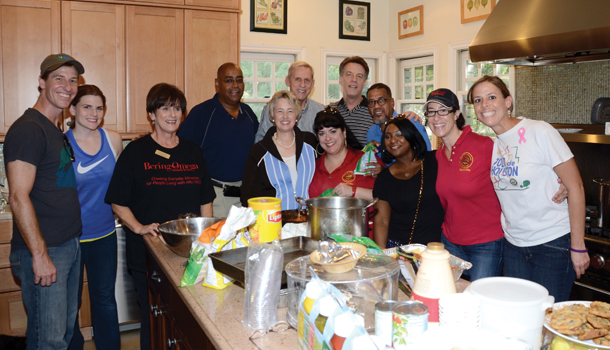
Three Decades at the Heart of Us: Bering Omega Community Services Celebrates 30 Years
By Rich Arenschieldt
Photo by Dalton DeHart
“Montrose” is (and always has been) the epicenter of Houston’s gay community. Developers may have changed the landscape and its demographic, but since 1926, one entity—Bering United Methodist Church—has remained, steadfast and unflinching in its commitment to the neighborhood. This congregation, originally comprised of German immigrants, has confronted various plagues throughout history (most notably yellow fever and polio). However, the church’s most enduring mark on the city’s gay landscape is Bering Omega Community Services (BOCS), born within the church and now celebrating its 30th anniversary.
Lary Barton, longtime volunteer and BOCS board member, recalls how their three flagship programs—hospice, adult daycare, and the dental clinic—were created. “At Bering Church, we loved and welcomed everyone—always. In the mid-’80s the leadership and congregation (which, at that time, was mostly heterosexual) realized the community’s need for specific unmet services. In response, they began to devote time and resources to caring for those who lived near our campus. It didn’t matter that the church’s own financial situation was tenuous—we raised funds on a grassroots level to accomplish what was necessary.
“What was profound about this,” Barton continues, “is that, suddenly, we were providing support services to people who had previously been productive members of society—well-connected men with professional positions and good incomes. At that time, their diagnosis took their health and depleted their resources. What is sometimes forgotten is that there was a sense of absolute hysteria surrounding HIV. Single men—even those that were straight—were being denied services and, if suspected of having HIV, were fired from their jobs. Bering Church, at that time, was one of the few safe places for gays to go.
Additionally, “many men who worked needed someone to look after their ill partners during the day,” Barton says. “This was crucial in order for couples to maintain an income, pay their rent, and keep food on the table. To meet this need, Bering started an adult daycare on campus. We provided meals, medicine, and limited medical assistance—something that still happens today.”
Retired dentist Dr. Ed Cordray remembers a similar initiative—the genesis of Bering Dental Clinic, currently managed by Dr. Mark Nichols, BOCS Vice President of Clinical Affairs.
“Dentist Bruce Smith and I were good friends,” Cordray recalls. “We began to be overloaded with patients who were being refused treatment by their own dentists. At that time, many oral manifestations of HIV infection were quite painful and required immediate treatment. We could not turn these patients away, even though many had lost their jobs, income, and insurance. Several local gay dentists treated many people for free.
“Bruce and I decided we needed a clinic,” Corday says. “Bering Church had some empty classrooms, which they agreed to let us use, and St. Luke’s United Methodist provided a large donation for the clinic buildout. We collected used dental equipment [in my pickup truck] and received free labor and materials to prepare the space. Interestingly, many of our donors requested discretion; they wanted to help but could not, for various reasons, be openly associated with an HIV clinic.
“At first, we only saw patients on Fridays,” Corday adds. “Then Dr. Mark Nichols appeared [in 1987] and agreed to be the clinic’s full-time volunteer. Many people worked to get the clinic open, but Dr. Nichols was its driving force. His guidance transformed it from a small, part-time endeavor into the internationally renowned facility that, today, treats patients and educates clinicians from around the world.
“Initially, local academic institutions were slow to support our work,” says Corday. “Then the dental school’s newly appointed dean, Dr. Catherine Flaitz, offered her expertise in helping to identify pathogens that affected our patients—she became invaluable to us.”
In addition to adult daycare and dentistry, Bering Omega’s end-of-life care (through its Omega House hospice) testifies to its enduring legacy. Founder Eleanor Munger asked Rev. Pittman McGehee, dean of Houston’s Christ Church Cathedral, for $10,000 [so they could] rent a small house to accommodate those at the end of life. Opened in 1986, the facility has been managed (for most of that time) by one person—its current director, Sandy Stacy, RN. The facility remains true to Munger’s original vision: a non-institutionalized, comfortable, spiritual (but nonsectarian) environment where patients are treated with respect and dignity.
When asked how he plans to commemorate this milestone, Joe Fuentes, the current CEO of the recently merged Bering Omega Community Services/HACS, responds, “I’ll celebrate when we successfully complete this merger,” a process begun two years ago. “Merging both boards of directors, staff, volunteers, and patients has taken some time—when that is finished in January 2016, then we’ll celebrate the newly-formed organization.”
“Looking back,” Fuentes says, “Omega House currently personifies how things have changed. Still used for its original purpose as a hospice, it is currently also available for respite care. People now leave the facility to live independently.”
When asked to reflect on those first efforts of BOCS, Dr. Ed Cordray sums up the organization’s impact: “At that time, people were scared to death; they possessed an almost animalistic fear about so many things. A small group of us confronted an insurmountable problem, and yet we still managed to provide people with what they needed. I’m proud that we were there at a time when everyone else was absent.”
Rich Arenschieldt is a frequent contributor to OutSmart magazine.











Comments